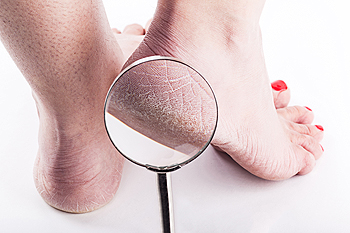 Cracked heels, if left untreated, can be an incredibly uncomfortable condition to deal with. If the cracks or fissures of the heel become deep enough, those affected may experience pain while standing, walking, or when putting any amount of pressure on the heels. Those who are obese, stand for long periods of time, or frequently wear open back shoes, may be more susceptible to developing cracked heels. Some of the first symptoms you may notice with this condition can include a hardening or thickening of the skin on the heels. In some cases, corns or calluses may form on the heel as well. In more severe cases, the heels may become discolored or begin bleeding, which is often indicative that an infection has formed. For more information, or to best treat cracked heels, it is suggested that you consult with a podiatrist for professional care.
Cracked heels, if left untreated, can be an incredibly uncomfortable condition to deal with. If the cracks or fissures of the heel become deep enough, those affected may experience pain while standing, walking, or when putting any amount of pressure on the heels. Those who are obese, stand for long periods of time, or frequently wear open back shoes, may be more susceptible to developing cracked heels. Some of the first symptoms you may notice with this condition can include a hardening or thickening of the skin on the heels. In some cases, corns or calluses may form on the heel as well. In more severe cases, the heels may become discolored or begin bleeding, which is often indicative that an infection has formed. For more information, or to best treat cracked heels, it is suggested that you consult with a podiatrist for professional care.
Cracked heels are unsightly and can cause further damage to your shoes and feet. If you have any concerns, contact Bruce Smit, DPM from Frankfort Foot & Ankle Clinic. Our doctor can provide the care you need to keep you pain-free and on your feet.
Cracked Heels
Cracked heels appear unappealing and can make it harder for you walk around in sandals. Aside from looking unpleasant, cracked heels can also tear stockings, socks, and wear out your shoes. There are several methods to help restore a cracked heel and prevent further damage.
How Do You Get Them?
Dry skin is the number one culprit in creating cracked heels. Many athletes, walkers, joggers, and even swimmers suffer from cracked heels. Age and skin oil production play a role to getting cracked heels as well.
Promote Healing
Over the counter medicines can help, especially for those that need instant relief or who suffer from chronic dry feet.
Wear Socks – Wearing socks with medicated creams helps lock in moisture.
Moisturizers – Applying both day and night will help alleviate dryness which causes cracking.
Pumice Stones – These exfoliate and remove dead skin, which allows for smoother moisturizer application and better absorption into the skin.
Change in Diet
Eating healthy with a well-balanced diet will give the skin a fresh and radiant look. Your body responds to the kinds of food you ingest. Omega-3 fatty acids and zinc supplements can also revitalize skin tissue.
Most importantly, seek professional help if unsure how to proceed in treating cracked heels. A podiatrist will help you with any questions or information needed.
If you have any questions, please feel free to contact our office located in Frankfort, IL . We offer the newest diagnostic and treatment technologies for all your foot care needs.